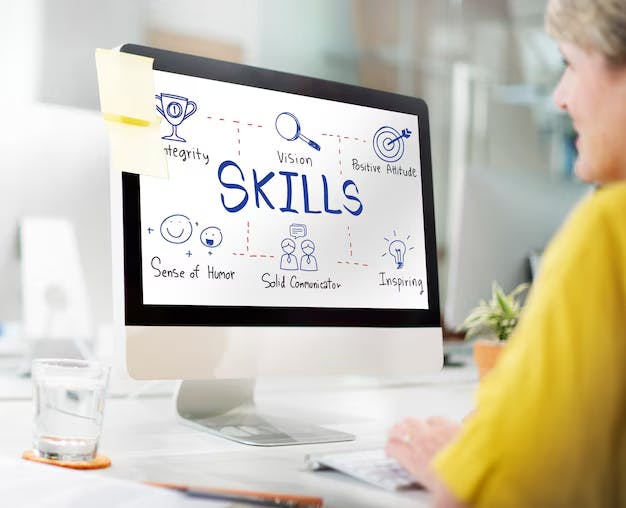50 Tips to Improve Job Performance
December 16, 2024
15 minutes
By Coachello

A multi-faceted journey that requires intentional efforts across personal Productivity, skill enhancement, communication, time management, relationship-building, and maintaining a healthy work life balance. Each area plays a critical role in shaping how effectively you contribute to your role and workplace. By setting clear goals, prioritizing tasks, and eliminating distractions, you can optimize your Productivity and focus. Continuous learning and seeking feedback help you stay relevant and grow in your field, while strong communication skills foster collaboration and understanding. Efficient time management ensures that your efforts align with high-impact objectives, and cultivating professional relationships strengthens teamwork, builds trust, and enhances employee performance. By integrating these strategies, you can achieve sustainable growth, exceed expectations, and thrive in your career.
Personal Productivity
Personal productivity, employee performance, and personal life are the cornerstones of professional success, emphasizing the ability to manage time, tasks, and focus effectively. By setting clear goals, prioritizing tasks based on urgency and importance, and identifying strategies to improve work performance, individuals can create a roadmap for success. Breaking down large projects into smaller, actionable steps prevents overwhelm, while techniques like the Pomodoro method and daily to-do lists boost concentration and efficiency. Eliminating distractions, such as unnecessary notifications or cluttered workspaces, helps maintain focus, while regular breaks replenish energy and creativity. Tools for time tracking and management further optimize workflow, ensuring that every minute contributes to meaningful progress.

1. Set Clear Goals
Setting clear goals is fundamental to improving performance, as it provides a roadmap for success and ensures you remain focused on your priorities. By defining objectives that are Specific, Measurable, Achievable, Relevant, and Time-bound, you create a structured plan that helps track progress and identify areas for improvement. Clear goals align your efforts with broader organizational objectives, reducing ambiguity and enabling more effective decision-making. Whether it’s completing a project or developing a new skill, having well-defined goals boosts motivation and ensures your energy is directed toward meaningful outcomes.
2. Prioritize Tasks Effectively
Prioritizing tasks effectively is essential for maximizing Productivity and ensuring important responsibilities are addressed first. By categorizing tasks based on urgency and importance, such as using the Eisenhower Matrix, you can focus your energy on high-priority items that align with your goals. This approach helps to prevent wasted effort on low-value activities and creates a clear roadmap for daily success, allowing you to manage your time efficiently and meet deadlines with ease.
3. Break Tasks Into Smaller Steps
Prioritizing tasks effectively means identifying and focusing on what’s most essential and urgent. Use tools like the Eisenhower Matrix to categorize tasks based on priority, ensuring critical items are addressed first. This approach prevents overwhelm, enhances Productivity, and helps you achieve goals efficiently.
4. Avoid Multitasking
Avoiding multitasking is key to improving focus and Productivity. When you split your attention across multiple tasks, the quality of your work often decreases, and it takes longer to complete each task. By concentrating on one task at a time, you can work more efficiently, reduce errors, and achieve better results.

5. Use Time Management Tools
Using time management tools can streamline your workflow by helping you organize tasks, set deadlines, and track progress. These tools provide clear visual timelines and reminders, ensuring you stay on top of priorities and make the most of your time.
6. Eliminate Distractions
Eliminating distractions is essential for maintaining focus, improving performance, and productivity. Start by identifying common interruptions, such as unnecessary notifications, cluttered workspaces, or frequent interruptions from colleagues. Use tools like noise-canceling headphones or apps that block distracting websites to create a more focused environment. A clean, organized workspace and setting clear boundaries during work hours can significantly reduce distractions, helping you stay on track and accomplish tasks efficiently.
7. Use the Pomodoro Technique
The Pomodoro Technique is a time management method that enhances productivity by dividing work into concentrated 25-minute sessions, known as “Pomodoros,” with a 5-minute break in between. This strategy helps sustain focus, reduce fatigue, and makes large tasks feel more achievable by establishing a balanced work pattern.
8. Create a Daily To-Do List
Creating a daily to-do list helps you stay organized and focused by outlining your priorities for the day. It ensures that essential tasks are noticed and provides a clear structure to manage your time effectively. By checking off completed items, you can track progress and maintain a sense of accomplishment throughout the day.
9. Take Regular Breaks
Taking regular breaks throughout your workday helps maintain focus, reduce stress, and improve overall productivity. Short pauses allow your mind to recharge, preventing burnout and boosting creativity when you return to tasks. Incorporate breaks strategically, such as stepping away from your desk or taking a quick walk, to enhance mental health as well as both mental and physical well-being.
10. Track Your Time Usage
Monitoring how you spend your time is crucial for understanding daily habits and discovering areas for optimization. By utilizing tools to track tasks and assess productivity, you can gain insights into where your time goes. This awareness enables you to streamline your schedule, minimize distractions, and prioritize the most important tasks.

Enhancing Skills
Enhancing skills is crucial for professional growth, improving performance, and staying competitive in any field. Continuously learning new skills not only boosts your expertise but also keeps you adaptable to evolving industry trends. Seeking regular feedback helps identify strengths and areas for improvement, allowing for targeted development. Embracing challenges, such as taking on unfamiliar tasks or cross-training with other departments, broadens your experience, enhances employee performance, and builds resilience. Participating in workshops, reading industry-related materials, and dedicating time to self-reflection fosters more profound knowledge and innovation. By learning from mistakes and engaging with mentors, you gain valuable insights and guidance, ensuring consistent personal and professional advancement.
11. Continuously Learn New Skills
Continuously learning new skills is essential for staying competitive in today’s dynamic work environment. It allows you to adapt to industry changes, increase your expertise, and open doors to new opportunities. Regularly explore online courses, certifications, or training programs relevant to your field to expand your knowledge and keep your skills sharp.
12. Seek Feedback Regularly
Regularly seeking feedback is essential for professional growth. It helps identify blind spots, refine skills, and align performance with expectations. Proactively ask for input from colleagues, supervisors, or clients, and use their insights constructively to improve your work and achieve better results.
13. Take on New Challenges
Taking on new challenges pushes you out of your comfort zone, helping you grow professionally and build resilience. Whether it’s leading a project, learning a new skill, or taking on responsibilities outside your usual scope, challenges provide opportunities to enhance your abilities and showcase your potential. Embrace them as stepping stones for growth and career advancement.

14. Join Workshops or Seminars
Attending workshops or seminars is a powerful way to enhance your skills and stay updated on industry trends. These events offer opportunities to learn from experts, gain new insights, and network with professionals who share your interests, providing fresh perspectives and valuable connections.
15. Read Industry-Related Books and Articles
Reading industry-related books and articles is a simple yet powerful way to stay informed about the latest trends, innovations, and best practices in your field. This habit not only enhances your expertise but also keeps you competitive by broadening your perspective and inspiring new ideas. Allocating just 15â30 minutes a day for reading can significantly improve your knowledge base and decision-making skills.
16. Practice Self-Reflection
Practice self-reflection by taking a few moments each day to evaluate your performance and mental health. Consider what went well, what challenges you faced, and how you can improve. This habit promotes personal growth, enhances decision-making, and helps you stay aligned with your goals.
17. Set Aside Time for Skill Development
Setting aside dedicated time for skill development is crucial for professional growth. By intentionally blocking time in your schedule, you can focus on acquiring new competencies or honing existing ones without distractions. Regularly investing in skill-building activities not only enhances your expertise but also keeps you competitive and adaptable in your industry.

18. Learn From Mistakes
Learning from mistakes is a vital step toward personal and professional growth. Instead of dwelling on errors, analyze what went wrong, identify the lesson, and apply that knowledge to future situations. This proactive approach not only prevents repetition but also strengthens problem-solving skills and resilience.
19. Cross-Train With Other Departments
Cross-training with other departments allows you to gain a broader understanding of your organization’s operations, improve collaboration, and develop versatile skills. By learning how different teams function, you can enhance communication, identify opportunities for synergy, and become a more valuable asset to your company.
20. Ask for Mentorship
Seeking mentorship is a powerful way to accelerate your professional growth. A mentor provides valuable guidance, shares industry insights, and helps you navigate challenges based on your experience. By building a strong relationship with a mentor, you can gain fresh perspectives, refine your skills, and achieve your career goals more effectively.
Improving Communication
Improving communication is a cornerstone of professional success, enabling smoother collaboration, stronger workplace relationships, and the ability to improve work performance. To communicate effectively, start by being clear and concise, ensuring your messages are easy to understand. Active listening is equally critical, as it fosters mutual respect and understanding. Providing and receiving constructive feedback helps build trust and encourages growth, while emotional intelligence allows you to navigate conversations with empathy and insight. Honing your writing skills ensures professionalism in emails and reports, while asking thoughtful questions drives deeper discussions and enhances employee performance. By fostering open dialogue, demonstrating positive body language, and exuding confidence in your communication, you can create an environment where ideas flow freely and goals are achieved efficiently.
21. Be Clear and Concise
Being clear and concise in communication ensures your message is understood without confusion. Use straightforward language, avoid unnecessary jargon, and focus on delivering the key points. This not only saves time but also increases the effectiveness of your interactions, whether in meetings, emails, or presentations.
22. Listen Actively
Active listening involves entirely focusing on the speaker, understanding their message, and responding thoughtfully. Avoid distractions, maintain eye contact, and ask clarifying questions to ensure comprehension. By truly hearing what others are saying, you can build trust, foster better communication, and make more informed decisions in your interactions.
23. Provide Constructive Feedback
Providing constructive feedback is about offering guidance that is both helpful and respectful. Focus on specific behaviors or actions rather than personal traits, and frame your feedback in a way that highlights opportunities for improvement. Use a balance of positive reinforcement and suggestions for growth, ensuring the recipient feels supported and motivated to take actionable steps.

24. Develop Emotional Intelligence
Developing emotional intelligence is essential for building strong workplace relationships and improving work performance. It involves understanding and managing your emotions, empathizing with others, and responding thoughtfully to situations. By cultivating self-awareness, practicing active listening, and showing empathy, you can navigate challenges more effectively, foster collaboration, and create a positive work environment.
25. Improve Your Writing Skills
Improving your writing skills is essential for clear and effective communication in the workplace. Focus on crafting concise, well-structured emails and reports, using professional language and proper grammar. Regularly practicing and seeking feedback can help you refine your style and adapt your writing to suit different audiences and purposes, ensuring your message is both impactful and easy to understand.
26. Learn to Ask Questions Effectively
Asking practical questions is a key skill for better communication and problem-solving. Focus on open-ended questions that encourage thoughtful responses and deeper discussions. Avoid yes-or-no queries and instead aim to clarify, explore, and gain insights, ensuring your questions are clear and relevant to the conversation.

27. Foster Open Communication With Your Team
Fostering open communication with your team creates a collaborative and trusting work environment where ideas, concerns, and feedback are freely shared. Encourage transparency by actively listening, inviting input, and ensuring all team members feel heard and valued. This openness not only strengthens relationships but also leads to more innovative solutions and improved team performance.
28. Be Open to Receiving Feedback
Being open to receiving feedback is crucial for growth and improvement. Approach feedback with a positive mindset, seeing it as an opportunity to learn rather than criticism. Listen actively, avoid becoming defensive, and ask clarifying questions if needed. Implement the suggestions to demonstrate your willingness to adapt and excel.
29. Use Positive Body Language
Using positive body language can significantly enhance communication and build stronger relationships in the workplace. Simple gestures like maintaining eye contact, smiling, and nodding affirmatively show attentiveness and encourage open dialogue. Standing or sitting with an open posture and avoiding crossed arms conveys approachability while mirroring others’ gestures can foster a sense of connection. These non-verbal cues create a welcoming environment, making interactions more effective and engaging.
30. Communicate With Confidence
Communicating with confidence means expressing your ideas clearly and assertively while maintaining respect for others. It involves using a steady tone, making eye contact, and presenting your thoughts with clarity and conviction. Confidence in communication fosters trust ensures your message is understood, and helps you navigate professional interactions more effectively.

Time Management
Effective time management is crucial for maximizing job performance, productivity, and achieving professional success. By using tools like calendars and project management software, you can plan and track your tasks efficiently. Focusing on high-impact priorities ensures that your energy is directed toward work that delivers the most value while delegating tasks and setting realistic deadlines help prevent burnout. Organizing your workspace and setting clear weekly and monthly goals create an environment conducive to sustained focus, professional development, and improved employee performance. Learning to say no to non-essential commitments protects your schedule and ensures you can dedicate time to what truly matters. Regularly reviewing and refining your time management strategies is key to maintaining balance and achieving long-term success.
31. Use a Calendar for Scheduling
Using a calendar for scheduling helps you organize tasks, set priorities, and manage deadlines effectively. By visualizing your commitments, you can allocate time for high-impact activities, avoid overlaps, and maintain a balanced workload. Digital tools like Google Calendar also allow easy adjustments and reminders, ensuring you stay on track and maximize Productivity.
32. Focus on High-Impact Tasks
Focusing on high-impact tasks means prioritizing work that delivers the most outstanding value and contributes significantly to your goals. Identify activities with the most substantial outcomes, tackle them during your peak productivity hours, and delegate or defer less critical tasks. This approach ensures your efforts generate meaningful results and optimize your time.
33. Avoid Procrastination
Avoiding procrastination is key to maintaining Productivity and meeting deadlines. Start by identifying the root causes of delay, such as fear of failure or feeling overwhelmed. Break tasks into smaller, manageable steps and tackle the most challenging ones first, often referred to as the “eat the frog” method. Set clear, achievable goals and use tools like timers or checklists to stay on track. By addressing tasks promptly, you reduce stress and create a steady workflow.

34. Set Realistic Deadlines
Setting realistic deadlines is essential for maintaining Productivity and reducing stress. Assess the scope of each task and allocate sufficient time to complete it without rushing. Overcommitting can lead to burnout and missed deadlines, so it’s essential to be honest about your capacity. By setting achievable timelines, you ensure consistent progress and deliver quality results.
35. Delegate When Possible
Delegating tasks allow you to focus on high-priority responsibilities while leveraging the strengths of your team. By assigning work to the right people, you not only enhance efficiency but also foster trust and collaboration. Effective delegation involves clear communication, setting expectations, and providing necessary resources to ensure successful outcomes.
36. Organize Your Workspace
Organizing your workspace is essential for boosting Productivity and focus. A clutter-free environment minimizes distractions, making it easier to locate tools and resources when needed. Keep only essential items on your desk, create a filing system for documents, and regularly declutter to maintain a clean and efficient workspace. This small effort can lead to significant improvements in your overall workflow.
37. Set Weekly and Monthly Goals
Setting weekly and monthly goals helps you stay focused on both short-term tasks and long-term objectives. By breaking down larger ambitions into manageable milestones, you can track progress more effectively, prioritize essential activities, and maintain alignment with your overall strategy. Regularly reviewing these goals ensures adaptability and keeps you on the path to success.
38. Use Project Management Software
Using project management software streamlines task organization helps track deadlines, and improves team collaboration. Centralizing project details in one place ensures everyone stays aligned and focused on priorities, enhancing overall efficiency and Productivity.

39. Review Your Time Management Regularly
Regularly reviewing your time management helps you identify areas for improvement and ensures you’re aligning your tasks with your goals. By reflecting on how you spend your time, you can spot inefficiencies, adjust priorities, and adopt better strategies to stay productive and focused.
40. Learn to Say No to Non-Essential Tasks
Learning to say no to non-essential tasks is crucial for maintaining focus and Productivity. Politely declining commitments that don’t align with your priorities allows you to allocate time and energy to tasks that genuinely matter, ensuring you deliver high-quality work and meet meaningful goals.

Building Professional Relationships
Building professional relationships is essential for fostering a supportive and collaborative work environment that drives individual and team success. Networking within your industry allows you to exchange ideas, stay updated on trends, and access new opportunities. Being a team player and offering support to colleagues promotes trust and cohesion while showing appreciation for others’ contributions, which helps build morale. Maintaining a positive attitude and being approachable encourages open communication, which is critical for effective collaboration. Emphasizing professional development while respecting diversity and resolving conflicts professionally ensures a harmonious workplace where everyone feels valued. Tracking performance metrics alongside celebrating team achievements further strengthens bonds, creating a culture of mutual respect and shared success.
41. Network Within Your Industry
Networking within your industry is essential for career growth and staying informed about trends. Attend events, join professional organizations, and connect with peers to exchange ideas, learn best practices, and discover new opportunities. Building strong relationships can open doors to collaborations, mentorships, and future advancements in your field.

42. Be a Team Player
Being a team player means actively contributing to group success by collaborating effectively, supporting colleagues, and sharing responsibilities. It involves open communication, a positive attitude, and a willingness to help others achieve shared goals, fostering a harmonious and productive work environment.
43. Offer Support to Colleagues
Offering support to colleagues fosters a collaborative work environment and strengthens team dynamics. By assisting when needed, sharing resources, delegating tasks, or simply offering encouragement, you help create a positive atmosphere that promotes mutual success. This support not only boosts morale but also enhances productivity, as it encourages a sense of camaraderie and trust within the team.
44. Show Appreciation for Others’ Work
Showing appreciation for others’ work is a simple yet powerful way to foster a positive and collaborative work environment. Acknowledging your colleagues’ efforts, whether through a thank-you note, a verbal compliment, or public recognition, boosts morale and strengthens relationships. This small gesture not only motivates individuals but also encourages a culture of respect and teamwork.

45. Be Approachable and Friendly
Being approachable and friendly creates a positive work environment where colleagues feel comfortable sharing ideas and collaborating. By maintaining an open demeanor, offering a smile, and actively engaging with others, you foster trust and make it easier for people to communicate with you. This not only strengthens relationships but also promotes teamwork and a sense of camaraderie in the workplace.
46. Collaborate Effectively
Collaborating effectively involves working together with colleagues to achieve common goals, which can significantly enhance employee performance. It requires clear communication, active listening, and a willingness to consider different perspectives. By fostering a collaborative environment, you can leverage the strengths of diverse team members, drive innovation, and achieve better outcomes. Successful collaboration also includes providing support, being open to feedback, and working towards mutually beneficial solutions.
47. Maintain a Positive Attitude
Maintaining a positive attitude in the workplace is essential for both personal well-being and team success. A positive outlook helps you stay motivated, overcome challenges, and inspire those around you. It fosters a productive environment, reduces stress, and encourages collaboration, and stronger relationships with colleagues.

48. Resolve Conflicts Professionally
Resolving conflicts professionally involves addressing disagreements calmly and respectfully, focusing on finding solutions rather than assigning blame. It’s important to listen actively, stay objective, and communicate clearly to understand different perspectives. By maintaining a positive attitude and working collaboratively, you can foster a productive environment where conflicts are resolved constructively, strengthening relationships and improving team dynamics.
49. Respect Diversity in the Workplace
Respecting diversity in the workplace involves valuing and embracing the differences in backgrounds, perspectives, and experiences of colleagues. It fosters an inclusive environment where all employees feel respected and empowered to contribute. By promoting diversity, organizations can enhance creativity, improve problem-solving, and build stronger teams, ultimately leading to a more prosperous and harmonious work environment.
50. Celebrate Team Achievements
Celebrating team achievements is essential for fostering a positive work environment and boosting morale. Recognizing accomplishments, both big and small, encourages collaboration, strengthens relationships, and motivates individuals to continue contributing their best efforts. Whether through a simple thank-you, a team celebration, or public acknowledgment, celebrating successes helps build a sense of community and reinforces the importance of teamwork in achieving shared goals.
Improving performance requires a balanced approach to personal productivity, skill enhancement, continuous learning, communication, time management, relationship-building, and regular training sessions. By incorporating these 50 tips into your daily routine, you can unlock new levels of success, efficiency, and fulfillment in your career. Start with a few tips today and gradually build momentum toward becoming the best version of yourself at work.
Share this article
Related Posts
Unlock the Power of Coaching
Enhance leadership, boost performance, and drive growth with AI-powered and human-led coaching.
Enter your email and we’ll send you the brochure



